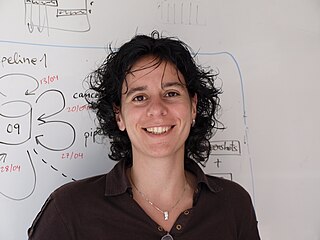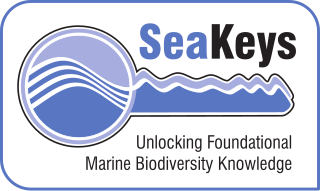
The University of Lausanne in Lausanne, Switzerland was founded in 1537 as a school of Protestant theology, before being made a university in 1890. The university is the second oldest in Switzerland, and one of the oldest universities in the world to be in continuous operation. As of fall 2017, about 15,000 students and 3,300 employees studied and worked at the university. Approximately 1,500 international students attend the university, which has a wide curriculum including exchange programs with other universities.

The SIB Swiss Institute of Bioinformatics is an academic not-for-profit foundation which federates bioinformatics activities throughout Switzerland.

The Biocomplexity Institute of Virginia Tech is a research organization specializing in bioinformatics, computational biology, and systems biology. The institute has more than 250 personnel, including over 50 tenured and research faculty. Research at the institute involves collaboration in diverse disciplines such as mathematics, computer science, biology, plant pathology, biochemistry, systems biology, statistics, economics, synthetic biology and medicine. The institute develops -omic and bioinformatic tools and databases that can be applied to the study of human, animal and plant diseases as well as the discovery of new vaccine, drug and diagnostic targets.
The Spanish National Bioinformatics Institute is an academic service institution tasked with the coordination, integration and development of bioinformatics resources in Spain. Created in 2003, the INB is—since 2015—the main node through which the Carlos III Health Institute is connected to ELIXIR, a European-wide infrastructure of life science data, coordinating the other Spanish institutions partaking in the initiative such as the Spanish National Cancer Research Centre (CNIO), the Centre for Genomic Regulation (CRG), the Universitat Pompeu Fabra, the Institute for Research in Biomedicine (IRB) and the Barcelona's National Supercomputing Center.
Erik Bongcam-Rudloff is a Chilean-born Swedish biologist and computer scientist. He received his doctorate in medical sciences from Uppsala University in 1994. He is Professor of Bioinformatics and the head of SLU-Global Bioinformatics Centre at the Swedish University of Agricultural Sciences. His main research deals with development of bioinformatics solutions for the Life Sciences community.
The African Society for Bioinformatics and Computational Biology (ASBCB) is a non-profit professional association dedicated to the advancement of bioinformatics and computational biology in Africa. Transformed from the African Bioinformatics Network (ABioNET), ASBCB was established in February 2004 at a meeting in Cape Town, South Africa. The Society serves as an international forum and resource devoted to developing competence and expertise in bioinformatics and computational biology in Africa. It complements its activities with those of other international and national societies, associations and institutions, public and private, that have similar aims. It also promotes the standing of African bioinformatics and computational biology in the global arena through liaison and cooperation with other international bodies. It is an affiliated regional group of the International Society for Computational Biology (ISCB).
The European Molecular Biology network (EMBnet) is an international scientific network and interest group that aims to enhance bioinformatics services by bringing together bioinformatics expertises and capacities. On 2011 EMBnet has 37 nodes spread over 32 countries. The nodes include bioinformatics related university departments, research institutes and national service providers.

Søren Brunak is a Danish biological and physical scientist working in bioinformatics, systems biology, and medical informatics. He is a professor of Disease Systems Biology at the University of Copenhagen and professor of bioinformatics at the Technical University of Denmark. As Research Director at the Novo Nordisk Foundation Center for Protein Research at the University of Copenhagen Medical School, he leads a research effort where molecular-level systems biology data are combined with phenotypic data from the healthcare sector, such as electronic patient records, registry information, and biobank questionnaires. A major aim is to understand the network biology basis for time-ordered comorbidities and discriminate between treatment-related disease correlations and other comorbidities in disease trajectories. Søren Brunak also holds a position as a Medical Informatics Officer at Rigshospitalet, the Capital Region of Denmark.

Yves A. Lussier is a physician-scientist conducting research in Precision medicine, Translational bioinformatics and Personal Genomics. As a co-founder of Purkinje, he pioneered the commercial use of controlled medical vocabulary organized as directed semantic networks in electronic medical records, as well as Pen computing for clinicians.

John Quackenbush is an American computational biologist and genome scientist. He is a professor of biostatistics and computational biology and a professor of cancer biology at the Dana–Farber Cancer Institute (DFCI), as well as the director of its Center for Cancer Computational Biology (CCCB). Quackenbush also holds an appointment as a professor of computational biology and bioinformatics in the Department of Biostatistics at the Harvard School of Public Health.

Aviv Regev is a computational biologist and systems biologist and Executive Vice President and Head of Genentech Research and Early Development in Genentech/Roche. She is a core member at the Broad Institute of MIT and Harvard and professor at the Department of Biology of the Massachusetts Institute of Technology. Regev is a pioneer of single cell genomics and of computational and systems biology of gene regulatory circuits. She founded and leads the Human Cell Atlas project, together with Sarah Teichmann.

Robert F. Murphy is Ray and Stephanie Lane Professor of Computational Biology Emeritus and Director of the M.S. Program in Automated Science at Carnegie Mellon University. Prior to his retirement in May 2021, he was the Ray and Stephanie Lane Professor of Computational Biology as well as Professor of Biological Sciences, Biomedical Engineering, and Machine Learning. He was founding Director of the Center for Bioimage Informatics at Carnegie Mellon and founded the Joint CMU-Pitt Ph.D. Program in Computational Biology. He also founded the Computational Biology Department at Carnegie Mellon University and served as its head from 2009 to 2020.

Tandy Warnow is an American computer scientist and Grainger Distinguished Chair in Engineering at the University of Illinois at Urbana–Champaign. She is known for her work on the reconstruction of evolutionary trees, both in biology and in historical linguistics, and also for multiple sequence alignment methods.
The South African National Biodiversity Institute (SANBI) is an organisation tasked with research and dissemination of information on biodiversity, and legally mandated to contribute to the management of the country's biodiversity resources.

Janet Kelso is a South African computational biologist and Group leader of the Minerva Research Group for Bioinformatics at the Max Planck Institute for Evolutionary Anthropology. She is best known for her work comparing DNA from previous humans with those of the present.

Núria López Bigas is a Spanish biologist and research professor with expertise in medical genetics, computational biology, and bioinformatics. She is an ICREA professor at Pompeu Fabra University and she also leads the Biomedical Genomics Research Group at the Institute for Research in Biomedicine in Barcelona, Spain. Her research is focused on developing computational approaches to investigate cancer genomes.

Michal Linial is a Professor of Biochemistry and Bioinformatics at the Hebrew University of Jerusalem (HUJI). Linial is the Director of The Sudarsky Center for Computational Biology at HUJI. Since 2015, she is head of the ELIXIR-Israel node.

SeaKeys is a large collaborative marine biodiversity project funded through the Foundational Biodiversity Information Program in South Africa. The purpose of the project is to collect and distribute genetic, species and ecosystem information relating to marine biodiversity in southern Africa, which may be used to support informed decision-making about the marine environment.
Keith A. Crandall is an American computational biologist, bioinformaticist, and population geneticist at George Washington University, where he is the founding director of the Computational Biology Institute, and professor in the Department of Biostatistics and Bioinformatics.
Alan Christoffels is a bioinformatics scientist, academic, and an author. He is Professor of Bioinformatics, and the director of the South African National Bioinformatics Institute at the University of the Western Cape. He has been serving as a senior advisor to the Africa Centres for Disease Control and Prevention Pathogen genomics & Partnerships and DSI/NRF Research Chair in Bioinformatics and Public Health Genomics.














